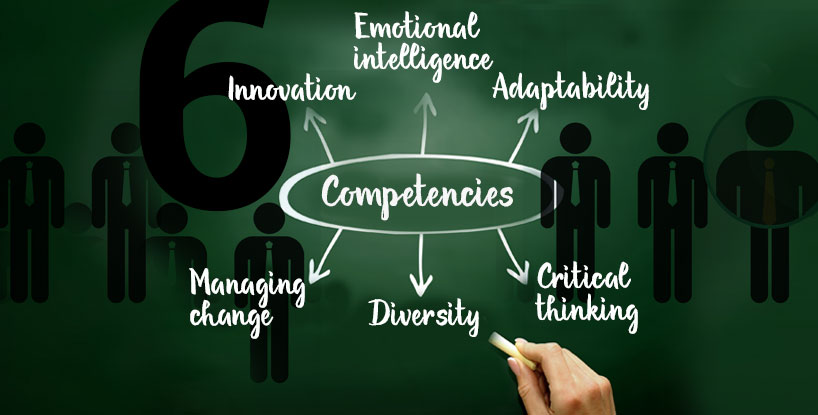Six competencies critical for future success in the workplace
We are living in a time of constant change which is reshaping the future landscape of work. The workforce in the next 20 years will look very different to the workforce of today. Over the next decade, new technologies will enter every domain of the workplace replacing humans, the jobs that we do and transforming the way we work. Globalization will continue to create greater cultural diversity and broaden the values and the set of beliefs held by organisations today. By 2030, four generations will be in the workplace simultaneously, each with unique attitudes, behaviours, strengths and weaknesses that will need to be recognized and managed coherently.
The new age will require a range of different skills in the workplace and skills that are considered important in today’s workforce will change. Therefore, it is important that organisations prepare for the future of work and align the skill set and capabilities of their employees to the challenges that will arise over the coming decades.
Future work skills
Looking ahead, we have identified six competencies that we believe are imperative in a digital age and define the threshold levels required to succeed in the workplace.
1. Innovation
Definition: The ability to find and apply new and creative approaches to work
Companies are increasingly confronted with shifts in industry transformation which have major implications on the skills employees need to succeed in their organisation. As business environments are becoming more complex, this requires employees to derive new solutions and approaches to navigate through this volatility and uncertainty. The employee of the next decade will have to be innovative to develop new ideas and new ways of working and combine this with an approach of continuous improvement to ensure that they are positively contributing to the success of the company.
2. Emotional intelligence
Definition: The ability to read and perceive emotions and adapt behavior accordingly
Emotionally intelligent employees are able to quickly assess the emotions of those around them and adapt their words, tone of voice, body language and gestures accordingly. This has always been a key skill for employees who need to collaborate and build relationships, however, it is now even more important as we are entering an era where we will be working with an increasingly diverse group of people from different cultures, backgrounds and generations. Furthermore, as artificial intelligence continues to change the landscape of work, emotional intelligence will continue be one of the vital assets that gives employees a competitive advantage over robots, machine and automation.
3. Adaptability
Definition: The ability to adapt and respond well to change
The ability to respond to unique and unexpected circumstances will be highly valued over the next decade. As jobs across all occupations are constantly changing and automation continues to gain traction, organisations are under pressure to adapt quickly to both the internal and external changing environments. Adaptable employees can make the necessary adjustments needed in a given timeframe to acknowledge, accept and respond to any changes that are occurring. In the future, employees will need to be open to new ideas and respond effectively to upcoming challenges, seizing any opportunities that can contribute towards a successful result or output.
4. Critical thinking
Definition: The ability to critically analyse and evaluate information, considering the facts from different perspectives
Critical thinking is often referred to as the most valued skill of the 21st century. Employees that can ‘critically think’ are able to filter and assimilate complex information in a manner that facilitates problem solving and ultimately enhances the decision-making process. Critical thinking is emerging as an important skill as companies need to balance and combine the use of data and analytics with objective reasoning for the purposes of informed decision making. Critical thinkers ask the right questions and recognise the right opportunities, ensuring that the company makes logical and successful business decisions.
5. Diversity
Definition: The ability to understand, practice and operate in different cultural settings
Organisations are increasingly viewing diversity as a driver of innovation, bringing different ways of thinking, skills and experiences together. As diversity in the workplace grows, it will become a pre-requisite for all organisations as they seek to represent and mirror the customers and communities that they serve. All employees, and not just the ones that operate in diverse geographical environments will need to be able to work effectively across different teams, understanding the breadth and depth of different working styles and cultural perspectives. The ability to understand and leverage those cultural differences will be essential in achieving organisational goals.
6. Managing change
Definition: The ability to manage, lead, enable and embed the process of change and transition
The old paradigm “the only thing that is constant is change” is very much true for today’s working environment when ideas, plans and processes can become redundant nearly overnight. This will cause an increasing demand for change management skills in the future. The ability to anticipate, adapt to and implement change will be pivotal. Every business and industry will require change management whether the company changes a policy, procedure, technology, process, service or product; businesses themselves need to continuously manage change as the habits of their customers and their consumers constantly change. Employees will have to be highly competent in managing change and well versed with change acceleration processes to oversee a period of continuous transition over the coming years.
What does this mean for your business?
Companies need to continuously adapt to the changing environment in which they operate. This requires strategic workforce planning and the development and implementation of talent management strategies to ensure that the workforce is equipped with the necessary skills to ensure future organisation success.
If you would like more information of how we can help your organisation prepare for the future, please contact us at info@peoplefirstme.com

